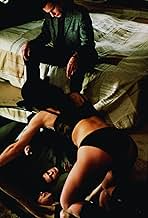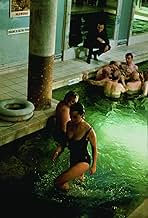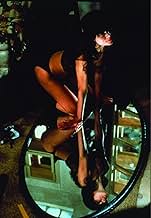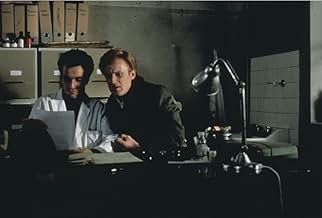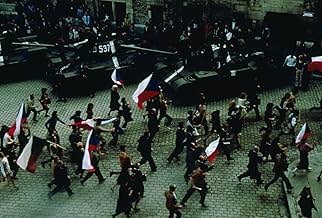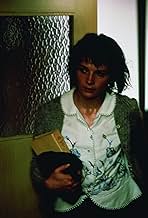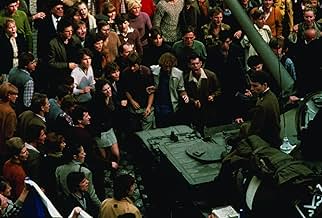Die unerträgliche Leichtigkeit des Seins
Originaltitel: The Unbearable Lightness of Being
Im Jahr 1968 lernt ein tschechischer Arzt mit einem äußerst aktiven Sexualleben eine Frau kennen, die sich Monogamie wünscht. Dann jedoch gerät ihr Leben durch die sowjetische Invasion völli... Alles lesenIm Jahr 1968 lernt ein tschechischer Arzt mit einem äußerst aktiven Sexualleben eine Frau kennen, die sich Monogamie wünscht. Dann jedoch gerät ihr Leben durch die sowjetische Invasion völlig aus den Fugen.Im Jahr 1968 lernt ein tschechischer Arzt mit einem äußerst aktiven Sexualleben eine Frau kennen, die sich Monogamie wünscht. Dann jedoch gerät ihr Leben durch die sowjetische Invasion völlig aus den Fugen.
- Regie
- Drehbuch
- Hauptbesetzung
- Für 2 Oscars nominiert
- 7 Gewinne & 14 Nominierungen insgesamt
Pavel Landovský
- Pavel
- (as Pavel Landovsky)
Stellan Skarsgård
- The Engineer
- (as Stellan Skarsgard)
Tomasz Borkowy
- Jiri
- (as Tomek Bork)
Pavel Slabý
- Pavel's Nephew
- (as Pavel Slaby)
László Szabó
- Russian Interrogator
- (as Laszlo Szabo)
Empfohlene Bewertungen
The best thing about the novel was that the events were more meaningful because along with each event came a piece of the author's philosophy which made not only the plot seem whole but the author's main philosophical argument materialize more and more as we read on.
The movie was only a documentation of the plot and because it was a movie I guess it could only "lightly" touch upon the author's philosophy. Maybe a narrator in the background could have filled us in? I watched the movie not because I enjoyed the plot but because I enjoyed reading the author's ideas about life. They weren't as evident in the movie, but I gave a 6 because the acting and cinematography were good.
The movie was only a documentation of the plot and because it was a movie I guess it could only "lightly" touch upon the author's philosophy. Maybe a narrator in the background could have filled us in? I watched the movie not because I enjoyed the plot but because I enjoyed reading the author's ideas about life. They weren't as evident in the movie, but I gave a 6 because the acting and cinematography were good.
for the courage to adapt the Kundera novel. and for science to not be only an adaptation. for superb acting and for care to details - the black umbrellas is only an example. for delicate poetry of images and for inspired use of politic frame for reflect the nuances of lead characters. and for the message who, for a viewer from East Europe , has a fundamental sound. because is more than a story about choices, forms of love, fragility and need of the other, roots of freedom and pure joy in a dark universe. it is a perfect reflection to remember the web of past as embroidery of life crumbs. and admire the admirable manner of actors to give life to the characters shadows and lights.
The Unbearable Lightness of Being (1988)
I liked this book a lot, and I like director Philip Kaufman's approach to movies. The best of this movie is terrific, as well: the wild culture of personal and cultural freedom at the start, the chilling invasion of Soviet tanks in the center, and the last half hour of idealized romance and happiness in the country.
That kind of gives away the movie, it would seem. But in a way, the movie is about how all these things happen. This is where it gets to be about taste and patience. It's a long movie, and much of the events are not really a development of plot, but a steady continuation of a variety of relationships (mainly between the lead man and the two main women). There is a plot behind all this, especially around their leaving Czechoslovakia and then finding a return to bliss in the Czech countryside, but this doesn't drive the movie overall.
For me, it wasn't enough to see these people enjoying sex and discovering conflicts between the three legs of the love triangle. Scenes were often leisurely in a way that implies we were glad to just be there and watch things happen within a pocket of frozen time, rather than through time. By that I mean, it wasn't where you were going with the emotional aspects, but it was where you were, the now of the interactions. The might actually be where the book was so successful--it created moods and scenes where you were, actually, glad to just be absorbed. For me, that wasn't always the case in the film version.
Part of the problem might just be Daniel Day Lewis, who is a bit too self-satisfied, not as a character (that is certain) but as an actor. He lacks the magnetism that might sustain the unlikely and ongoing love the two women have for him, even as they know about each other. On the other hand, it's a huge, epic tale about true freedom, and a very real pursuit of happiness. And when the energy gets going, and the mood is fully expanded, there is magic. Especially, again, at the end, including the famous fade to white in the last frames, it is about a kind of heaven on earth. Who can object to that?
I liked this book a lot, and I like director Philip Kaufman's approach to movies. The best of this movie is terrific, as well: the wild culture of personal and cultural freedom at the start, the chilling invasion of Soviet tanks in the center, and the last half hour of idealized romance and happiness in the country.
That kind of gives away the movie, it would seem. But in a way, the movie is about how all these things happen. This is where it gets to be about taste and patience. It's a long movie, and much of the events are not really a development of plot, but a steady continuation of a variety of relationships (mainly between the lead man and the two main women). There is a plot behind all this, especially around their leaving Czechoslovakia and then finding a return to bliss in the Czech countryside, but this doesn't drive the movie overall.
For me, it wasn't enough to see these people enjoying sex and discovering conflicts between the three legs of the love triangle. Scenes were often leisurely in a way that implies we were glad to just be there and watch things happen within a pocket of frozen time, rather than through time. By that I mean, it wasn't where you were going with the emotional aspects, but it was where you were, the now of the interactions. The might actually be where the book was so successful--it created moods and scenes where you were, actually, glad to just be absorbed. For me, that wasn't always the case in the film version.
Part of the problem might just be Daniel Day Lewis, who is a bit too self-satisfied, not as a character (that is certain) but as an actor. He lacks the magnetism that might sustain the unlikely and ongoing love the two women have for him, even as they know about each other. On the other hand, it's a huge, epic tale about true freedom, and a very real pursuit of happiness. And when the energy gets going, and the mood is fully expanded, there is magic. Especially, again, at the end, including the famous fade to white in the last frames, it is about a kind of heaven on earth. Who can object to that?
Milan Kundera's masterwork is one of the most profound, powerful and perspicacious work of literary fiction of all-time. However, as one either already knows or soon discovers: a novel and a film are completely different media.
Kaufman's vision is elegant, eloquent and enigmatic. This is necessary to translate the directness and deepness of Kundera's prose. The film unable to delve into the innermost feelings and proclivities of its characters tries to say more by saying less. The movie takes the essence and uses powerful, calculated imagery as its driving motor. This is how this strongly resembles the late Stanley Kubrick's work: meticulous, hard on the actors and often also demanding on the viewers.
Kundera is heard throughout by having some of its most essential prose and ideas integrated into the dialog now and then, but as you've probably guessed, the film cannot capture the sublime subtleties and evocative expansions of the novel. Franz's and Sabina's "dictionary of incomprehension" is only hinted at, while Tomas' son is nonexistent and Tereza's turning moment at the mountain foregone. The focus is highly on the sensuality and, primate, playful to intimate, infidelity. This was a good choice as this dichotomy requires little words to be heard. However, when the characters do speak, the dialog dashes across the screen and dances in your head to be sure. The political overtone is also present with the departure and return to Prague being treated as almost opposite end of a colour spectrum. Kundera hypothesizes on how politics and nudity are one and the same, but Kaufman shows it with vivid imagery on both sides and emblematic parallelism.
The acting and editing make it all work together although there are a few low points in both instances. The two female leads are pretty much incredible. The classic music is charming and appropriate. The writing and directing are on point and the philosophy and melancholy of Kundera finds an appropriate echo in this visceral art medium.
With a slow beginning, the movie quickly builds momentum and the viewer hardly realizes its long running time. The character interactions and tensions, the stunning cinematography and succession of memorable scenes and dialog inspired greatly by the original work, make the viewer actually wish the movie would go on a little longer, whisper something more to its ear. Tomas sums it up by stating his general happiness despite his unforeseen and unwanted condition. After all life is light, you cannot take it too seriously.
Kaufman's vision is elegant, eloquent and enigmatic. This is necessary to translate the directness and deepness of Kundera's prose. The film unable to delve into the innermost feelings and proclivities of its characters tries to say more by saying less. The movie takes the essence and uses powerful, calculated imagery as its driving motor. This is how this strongly resembles the late Stanley Kubrick's work: meticulous, hard on the actors and often also demanding on the viewers.
Kundera is heard throughout by having some of its most essential prose and ideas integrated into the dialog now and then, but as you've probably guessed, the film cannot capture the sublime subtleties and evocative expansions of the novel. Franz's and Sabina's "dictionary of incomprehension" is only hinted at, while Tomas' son is nonexistent and Tereza's turning moment at the mountain foregone. The focus is highly on the sensuality and, primate, playful to intimate, infidelity. This was a good choice as this dichotomy requires little words to be heard. However, when the characters do speak, the dialog dashes across the screen and dances in your head to be sure. The political overtone is also present with the departure and return to Prague being treated as almost opposite end of a colour spectrum. Kundera hypothesizes on how politics and nudity are one and the same, but Kaufman shows it with vivid imagery on both sides and emblematic parallelism.
The acting and editing make it all work together although there are a few low points in both instances. The two female leads are pretty much incredible. The classic music is charming and appropriate. The writing and directing are on point and the philosophy and melancholy of Kundera finds an appropriate echo in this visceral art medium.
With a slow beginning, the movie quickly builds momentum and the viewer hardly realizes its long running time. The character interactions and tensions, the stunning cinematography and succession of memorable scenes and dialog inspired greatly by the original work, make the viewer actually wish the movie would go on a little longer, whisper something more to its ear. Tomas sums it up by stating his general happiness despite his unforeseen and unwanted condition. After all life is light, you cannot take it too seriously.
Although the screenplay is based on the great and world-famous book by Milan Kundera, it was written by others (Jean-Claude Carrière and the director Philip Kaufman) and thus lost its original touch and approach - as was pointed out by Kundera himself who withdrew from the outcome. On the other hand, fragile feelings, ponderings and internal doubts are very difficult to express on the screen - without losing the pace and uniformity of the plot. It is also pity that Prague was not / could not been used, as it is a beautiful city and gives more realism than the French places used. Depicion of the socialist/communist oppression is, however, rather perfunctory, seeming not so serious as it really was in the 1970ies within the Warsaw block when hopes of intellectuals for the so-called human-faced socialism vanished as liberal steps were diminished or repealed.
The cast is, of course, brilliant, in particular the bohemian ménage à trois members: Daniel Day-Lewis as Tomas, Juliette Binoche as Tereza and Lena Olin as Sabina - all later multiple Academy Award winners and/or nominees, and from different European countries (the movie itself is still the US one). They and some other fine European actors have provided the movie a real European atmosphere, without a Hollywood studio feeling as sometimes perceived in "older" movies.
Nevertheless, The Unbearable Lightness of Being is still a movie high above average, enhancing historical facts as well. But it is hard to say whether is is recommendable to read the book before or after...
The cast is, of course, brilliant, in particular the bohemian ménage à trois members: Daniel Day-Lewis as Tomas, Juliette Binoche as Tereza and Lena Olin as Sabina - all later multiple Academy Award winners and/or nominees, and from different European countries (the movie itself is still the US one). They and some other fine European actors have provided the movie a real European atmosphere, without a Hollywood studio feeling as sometimes perceived in "older" movies.
Nevertheless, The Unbearable Lightness of Being is still a movie high above average, enhancing historical facts as well. But it is hard to say whether is is recommendable to read the book before or after...
Wusstest du schon
- WissenswertesThe first cut shown to the studio was under two hours in length and the story was confusing. Philip Kaufman was asked to add in scenes he cut. The next day they were shown the theatrically released version. It's believed Kaufman showed them a shorter and confusing version in order to get his almost three-hour final cut approved with no questions of cutting it.
- PatzerMephisto the Pig, consistently referred to as "he", is a sow, as can be seen frequently, but particularly when the group enters the inn for dancing.
Top-Auswahl
Melde dich zum Bewerten an und greife auf die Watchlist für personalisierte Empfehlungen zu.
- How long is The Unbearable Lightness of Being?Powered by Alexa
Details
- Erscheinungsdatum
- Herkunftsland
- Offizielle Standorte
- Sprachen
- Auch bekannt als
- La insoportable levedad del ser
- Drehorte
- Prag, Tschechische Republik(archive footage)
- Produktionsfirma
- Weitere beteiligte Unternehmen bei IMDbPro anzeigen
Box Office
- Budget
- 17.000.000 $ (geschätzt)
- Bruttoertrag in den USA und Kanada
- 10.006.806 $
- Eröffnungswochenende in den USA und in Kanada
- 202.189 $
- 7. Feb. 1988
- Weltweiter Bruttoertrag
- 10.006.806 $
- Laufzeit
- 2 Std. 51 Min.(171 min)
- Farbe
- Sound-Mix
- Seitenverhältnis
- 1.85 : 1
Zu dieser Seite beitragen
Bearbeitung vorschlagen oder fehlenden Inhalt hinzufügen


